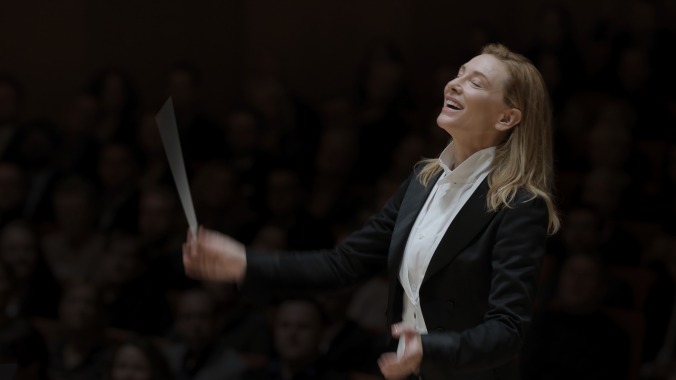In Tár, Cate Blanchett and Todd Field make beautiful music together
With Cate Blanchett as his muse, writer-director Todd Field creates an indelible portrait of intellect and expertise waylaid by privilege

From its very first moments, Tár announces itself as an event. It’s not just another movie—it’s an immersive visual and aural experience. The credits play in full at the beginning, backgrounded by eerie music. It immediately conveys majesty and sophistication. Writer-director Todd Field took this cue from the work of major orchestras, which fits the theme of the movie but also adds gravitas. Even the accent in the title tells us there’s pretension. And when we meet the eponymous character, we immediately understand the significance.
Lydia Tár (Cate Blanchett) is a composer and the principal conductor for the Berlin Philharmonic. She’s operating not only with a peerless skill set, but at the highest level of the cultural pecking order—there are few others in the world, much less her artistic community, with the same name recognition. While being interviewed onstage by The New Yorker’s Adam Gopnik in the film’s opening scene, she reveals she was mentored by Leonard Bernstein—along with several others, real people who help establish the circles in which Lydia works. Intercut with tailors fitting a suit to her precise specifications, it’s clear that hers is a world of refinement, luxury, fame, and most importantly, utmost reverence—as much to her as to the classical music that she conducts.
Lydia teaches at Juilliard, and presides over rehearsals in Berlin. Her assistant (Noémie Merlant) and her wife (Nina Hoss), the latter of whom is also the principal violinist in her orchestra, know her intimately—perhaps even better than she knows herself. Although she’s indisputably a genius, she’s also a narcissist, either dismissing those who disagree with her, or rebuking them in a withering display of intellect. Unsurprisingly, deception and hidden truths seem to be a part of even her closest relationships.
Tár is a film about the artistic process, and the hierarchy of prestigious cultural institutions. As Lydia rehearses Mahler’s fifth symphony for an upcoming live recording—her tenth such symphony, commemorating what she might imagine is her ascent to Bernstein’s throne—she recruits, promotes, and discards musicians with equal authority, even entitlement. Her genius is evident even when she takes a disruptive noise from a neighbor’s apartment and creates a beautiful piece of music from it. She’s sure-footed and in command. At the same time, she abuses her power and position, dismantles anyone who crosses her, and ignores the consequences—for the target of her piercing judgments, and eventually, for herself as well. She’s a dictator, but one whose expertise and intellect is so seductive that she’s able to cajole those around her to do her bidding.
In a great role that might come rarely even for an actor of her stature, Blanchett ferociously tears into this extraordinary—and presumably extraordinarily challenging opportunity. Of course this “ultimate thespian” learned to conduct, play instruments and speak in multiple languages, but what she does here goes beyond study, memorization, or technique. She evidences as much control of her instrument as the virtuosos performing in the character’s orchestra, with an immediacy and rhythmic flow to her performance that manifests both physically and emotionally. The timber of her voice is deeper, her gait is halting and fluid simultaneously, and Field utilizes long takes to highlight her absolute and yet seemingly fully intuitive control in the role. Lydia might be a cruel narcissist, but Blanchett is utterly bewitching. We understand her appeal and are drawn to her, despite all that’s transpiring.
Field’s script doesn’t offer any easy answers to further push the audience toward or away from her sympathies. Dense and full of mysterious clues, it’s a jigsaw puzzle for the audience to solve as they are watching. Meanwhile, Hoss serves as a mirror, making clear on her face all of the things that happen off screen, or that are unrevealed. Every cut to her silently communicates exactly what has happened. Matched with Blanchett, they better give us the full history of their relationship in a few looks and shared embraces than dialogue ever could.
Field, who hasn’t directed a feature for 16 years, returns with just as sharp a focus as before, and even more perceptiveness about the existential questions of the moment. The director who dissected post 9/11 ennui in Little Children (2006) is of course able to tackle the cultural questions of these post pandemic times; not simply a movie about cancel culture or #MeToo, it goes beyond to examine how and why power corrupts in these privileged cultural and hierarchical settings.
And yet, Tár does not tell us what to think of Lydia. She’s the central character, though the film is not told from, or arguing for, anybody’s point of view. It’s a fly on the wall, offering no comment but observing the proceedings with a merciless detachment. And after an exhilarating 157 minutes, its grip feels less like a quagmire than a beautifully unanswered question—a symphony we’ve been equipped to understand, but which refuses to supply a definitive interpretation.